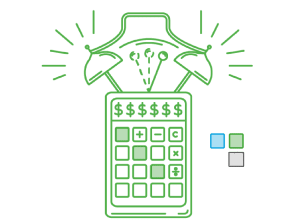From this article, you will learn:
- What the consequences are for blank invoices that employees issue without the entrepreneur's knowledge?
- Who is responsible for VAT due on blank invoices?
On 30 January 2024, the Court of Justice of the European Union issued a judgment in case C 442/22, concerning a dispute between a Polish entrepreneur and the tax office. The Tribunal decided on the issue of liability for issuing so-called "blank" invoices (i.e. false invoices that do not document actual economic events). The CJEU found that in situations where there is obvious fraud committed by employees, entrepreneurs cannot be considered the issuer of a VAT invoice within the meaning of Art. 108(1) of the VAT Act and Art. 203 of Council Directive 2006/112/EC.
The essence of the dispute – liability for VAT resulting from blank invoices
In the case discussed by us, the dispute with the tax office was conducted by a company operating in the fuel sales industry. An employee of this company, employed as a manager of one of the gas stations, issued false invoices documenting the sale of fuel for over four years.
The basis for issuing invoices were receipts issued to natural persons who had previously purchased fuel at the station. Gas station employees collected receipts thrown into the trash by customers and then handed them over to the manager, who – in exchange for material benefits – issued collective invoices to entities that then deducted VAT from these invoices.
The tax office detected this practice and issued a decision specifying the amount of VAT due. According to the tax office, the company did not exercise due diligence because the manager was able to issue invoices outside the IT system, which means negligence on the part of the company.
The company opposed the decision, arguing that it was not the company, but the employee who was dismissed for disciplinary reasons after the practice was discovered, who was responsible for issuing false invoices. The case went all the way to the Supreme Administrative Court, which decided to suspend the proceedings and refer two preliminary questions to the Tribunal regarding the interpretation of Art. 203 of the VAT Directive:
- In a situation where an employee, without the employer's knowledge and consent, issued a false invoice showing the employer's details as a taxpayer, should the employer or the employee be considered the person liable to pay VAT?
- In order to decide who is obliged to pay VAT on a blank invoice, is it important to determine whether the employer can be accused of failing to exercise due diligence?
Learn more about tax advisory services
Resolution: the employer does not have to bear the negative consequences, VAT on blank invoices can be collected from the employee
According to the CJEU, the person obliged to pay VAT is the person who shows the VAT due on the invoice, but it does not necessarily have to be the entity whose data – without its knowledge or consent – were included on the invoice as the issuer's data.
In the present case, the station manager who used her employer's data in an unauthorized manner and issued invoices documenting fictitious sales is obliged to pay VAT. At the same time, the Tribunal emphasised that the company should take all steps to determine whether it is not involved in fraud.
The CJEU also noted that the limits of activities undertaken by an entity to detect tax fraud should be set in a rational manner. It is up to the national court to assess whether the company did not control its employees or participated in fraud, however, the tax office cannot make entrepreneurs liable for VAT resulting from empty invoices without any reflection, it is necessary to prove to the taxpayer the lack of due diligence.
The impact of the CJEU judgment on the situation of Polish taxpayers – in order to be held liable, guilt must be proven
The CJEU judgment clearly shows that a company is liable for VAT resulting from an empty invoice only if its purpose was to commit tax fraud or if it did not exercise control over the company's accounting. If blank invoices were issued by an employee who derived financial benefits from them and who used her employer's data in an unauthorised manner, she is liable for VAT. Thus, the CJEU clearly stated that courts cannot "in advance" hold an entrepreneur who appears on blank invoices liable for VAT as the issuer, and each case should be examined individually.
The Polish tax authorities often use the concept of due diligence without specifying what it is or what its framework is, and the requirements imposed by Polish officials on entrepreneurs are often excessive. The theses contained in the CJEU judgment may constitute an important argument for taxpayers, very useful in possible disputes with the Polish tax office. In its judgment, the Tribunal clearly draws attention to the fact that due diligence means that an economic entity performs actions that can be reasonably required of it. This rationality of requirements is something that the Polish tax authorities often lack, which is why the CJEU judgment should be interpreted as favorable from the point of view of taxpayers’ interests.





